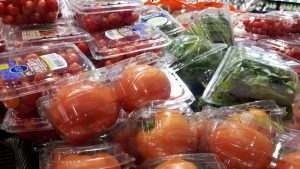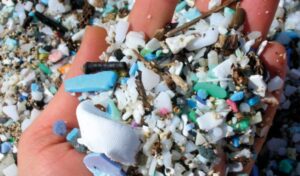- Regulatory Tools
- Circular Economy
- Government
- Government Policy
- Labelling
- Recycling
- Policy
- Strategy and Policy
- Take Action
- National
Solving the plastic problem: Here are some Hamilton businesses helping reduce waste at home
You can find them stuck up in trees, blowing across a downtown street, washing up on the Lake Ontario shoreline, or even stuck in a ditch along a rural Hamilton highway. Plastic bags are everywhere.
Despite recycling programs, the president of a Hamilton-based packaging company says most of the waste plastics we put in our blue bins are not recycled
Robert Pocius, the founder of TekPak Solutions, says we continue to rely on cheap and convenient plastics because they are more sustainable to make than any current alternatives. For example, he says, one truck of plastics can ship the same number of shopping bags as 14 trucks carrying paper.
They might be more sustainable to produce, but “now they’re everywhere, and nobody thought, ‘How do we get rid of them?’” Pocius says.
His company — primarily producing eco-friendly coffee-style bags and pouches — is one of many Hamilton businesses working to help reduce landfill-destined waste.
Car-free and living in Toronto, fashion designer Lex Brown found herself looking to replace those rolls of bags at the grocery store — the produce bags “that no one can ever open.”
It was a challenge because she needed something lightweight and super durable, but also, she says, “something a little bit more stylish.”“As a fashion designer I find that the eco-world has one kind of esthetic and that’s not always all inclusive … I don’t really want a hemp bag,” Brown says.
She started Neoteny Apparel in 2016 focusing on sustainable production and “eco-accessories.” And after moving back to Hamilton, she opened James Street North boutique consignment shop Reloved in March 2020 with her mother and sister.
Her produce bags — she calls them utility bags — now come in five sizes, including one “specifically designed to fit two heads of lettuce,” she says. As well, Brown makes bulk food bags and collapsible totes that are available at Reloved and soon online at NeotenyApparel.com.
Keeping food fresh is the aim of Mind Your Bees Wraps founder and CEO Ashley Shortall; “Plastic doesn’t do it, it suffocates food,” she says.
She started her beeswax wraps business in 2017 and, since then, she has added other products, such as Swedish sponge cloths.
Shortall says people “addicted to convenience” don’t understand the benefit of doing away with plastic wrap or paper towel to replace them with a more expensive alternative.
“Each (cloth) replaces 17 to 25 rolls of paper towel,” Shortall says, but the savings is not immediate, so “people look at it and say ‘$7 for a cloth, nah.’ Well, it’s compostable, it’s made out of paper and cotton byproducts, and when it’s done you just throw it in the compost.”
TekPak’s products are not compostable and the bags might still end up in landfills — or worse, in the oceans or in the soil — but the oil-based plastic technology is processed with an additive that attracts microbes helping the bag biodegrade much faster than the alternative, Pocius says.
Pocius was already an established packaging producer when he started TekPak in 2007 to respond to requests for biodegradable packaging. Now his company ships their “omnidegradable” bags internationally. They can also be found being used by local companies, such as Relay Coffee Roasters.



